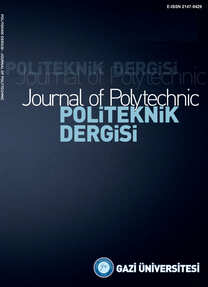Predictive-Equivalent Consumption Minimization Strategy for Energy Management of A Parallel Hybrid Vehicle for Optimal Recuperation
Paralel Hibrit Elektrikli Aracın, Optimal Reküperatif Frenleme için Öngörülü-Eşdeğer Yakit Tüketimi Minimizasyonu Startejisi ile Enerji Yöntemi
___
"Creating the Clean Energy - Economy Analysis of the Electric International Washington, DC, (2013)"Studying the PEV Market in California: Comparing the PEV, PHEV and Hybrid Markets", Technical Report, Gil Tal, Michael A. Nicholas, EVS27, Barcelona, Spain, (2013) Technical Report, Council, Economic Development 2. 3.
"Hybrid Electric Vehicles - An overview of current technology and its application in developing and transitional countries", UNEP, Kenya, (2009)
Serrao, L., Simona, O., Rizzoni. "A Comparative Analysis of Energy Management Strategies for Hybrid Electric Vehicles", Journal of Dynamic Systems, Measurement, and Control, Vol. 133, (2011)
5. Salmasi, F., "Control Strategies for Hybrid Electric Vehicles: Evolution, Classification, Comparison, and Future Trends," IEEE Trans. Veh. Technol., 56(5), pp. 2393-2404, (2007)
6. Brahma, A., Guezennec, Y., and Rizzoni, G., "Optimal Energy Management in Series Hybrid Electric Vehicles," Proceedings of the 2000 American Control Conference, Vol. 1, pp. 60-64, (2000)
Lin, C.-C., Peng, H., Grizzle, J. W., Liu, J., Busdiecker, M., "Control System Development for an Advanced- Technology Medium-Duty Hybrid Electric Truck." SAE, (2003)
Schori, M., Boehme, T. J., Frank, B., Schultalbers, M., "Calibration of Parallel Hybrid Vehicles Based on Hybrid Optimal Control Theory", 9th IFAC Symposium on Nonlinear September 4-6, (2013)
Zhao, Z., Hu, F., "Optimization of Control Parameters in Parallel Hybrid Electric Vehicles Using a Hybrid Genetic Algorithm", IEEE Vehicle Power and Propulsion Conference (VPPC), (2010) Toulouse, France, 9.
Kim, N., Cha, S., Peng, H., "Optimal Control of Hybrid Electric Vehicles Based on Pontryagin's Minimum Principle", IEEE Transactions on Control Systems Technology, (2010)
Cong, H., Ouyang, M. Xu, L., Wang, H. "Approximate Pontryagin's minimum principle applied to the energy management of plug-in hybrid electric vehicles", Applied Energy Journal, Elsevier (2014)
Dincmen, E., Guvenc, B. A., "A Control Strategy for Parallel Hybrid Electric Vehicles Based On Extremum Seeking", Vehicle System Dynamics, vol. 50, no. 2, pp. 199-227, (2012)
Musardo, C., Rizzoni, G., Staccia, B., "A-ECMS: An Adaptive Algorithm for Hybrid Electric Vehicle Energy Management", 44th IEEE Conference on Decision and Control, and the European Control Conference, Spain, (2005)
Sivertsson, M., Sundström, C., Eriksson, L., "Adaptive Control of a Hybrid Powertrain with Map-Based ECMS" World Congress, Volume # 18 - Part 1, (2011)
Simona, O. Serrao, L., "On Adaptive-ECMS strategies for hybrid electric vehicles", Int. Scient. Conf. on hybrid and electric vehicles, (2011)
Gong, Q., Tulpule, P., Marano, V., Midlam-Mohler, S., Rizzoni. G. "The Role of ITS in PHEV Performance Improvement", IEEE American Control Conference, (2011)
Donald E. Kirk, "Optimal Control Theory: An Introduction", Dover Publications, April 30, (2004)
- ISSN: 1302-0900
- Yayın Aralığı: 6
- Başlangıç: 1998
- Yayıncı: GAZİ ÜNİVERSİTESİ
Mustafa SEKMEN, MUSTAFA GÜNAY, ULVİ ŞEKER
Bilin Aksun GÜVENÇ, Emre KURAL
Ziya CABA, Orhan ATABAY, Ahmet GÜNEY
Ali AKBULUT, M. Hasan BODUROĞLU
Ta3B4-tipi TiX2B4 (X=Li, Na, Mg ve Ca) Bileşiklerinin İlk-Prensiplerle İncelenmesi
